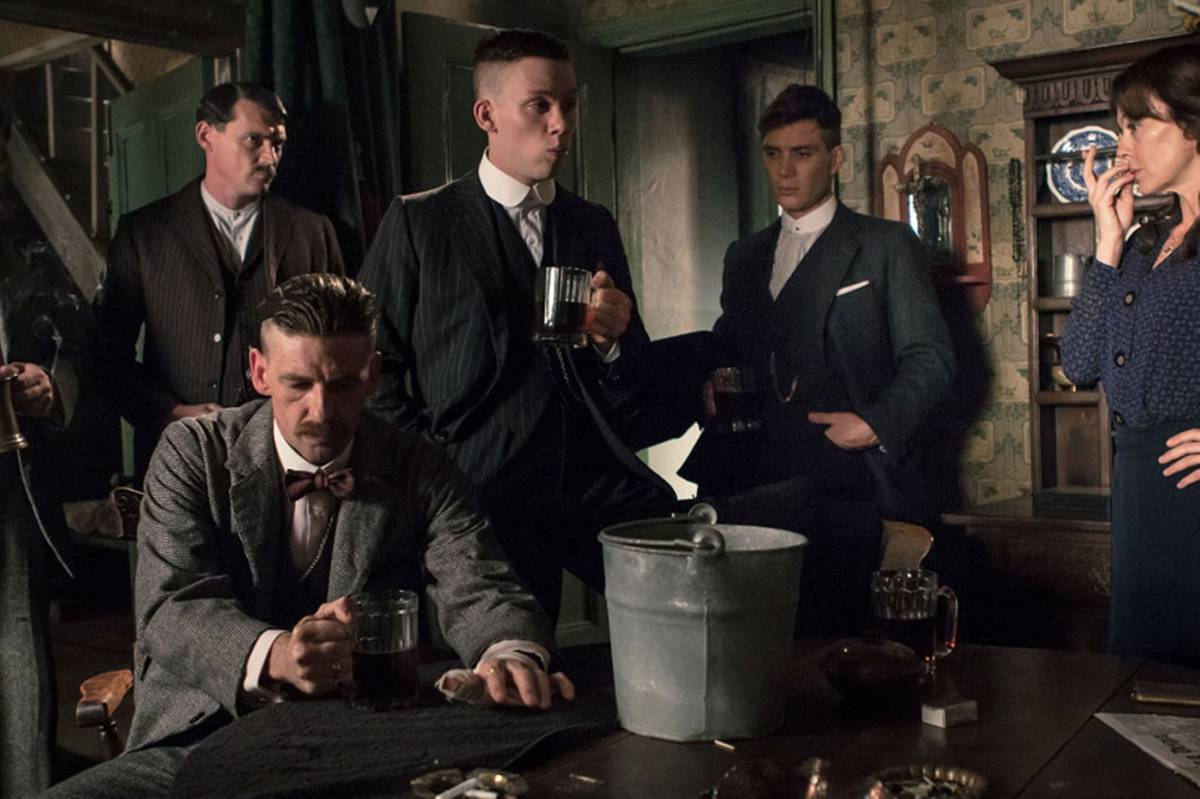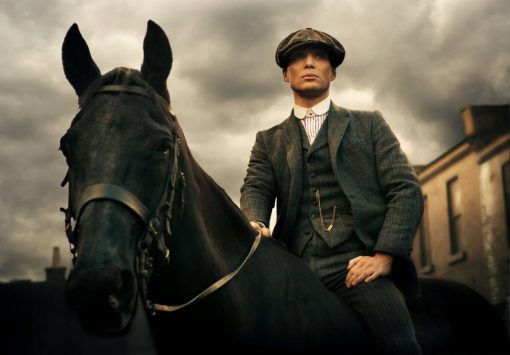Peaky Blinders is rare thing for British television, it’s as ambitious with its teleplays and direction as it is with the sheer production value displayed on screen. As we all know it’s not about the budget, which is estimated to be a million pounds an episode, you need the talent, innovation and intelligence to go with it. Unlike many British dramas, particularly ones on the BBC, the show doesn’t shy away when it comes to telling its stories each week. It fully embraces its adult themes and levels of violence, which are never used in a mindless or insensitive manner but always aim to aid the storytelling.
It may follow a family of gangsters in lawless 1920s Birmingham and the show does have its fair share of shootouts, murder, booze, beautiful women and violence but the show’s real strength lies within its themes and characters. The show focuses on ambition, greed, trust and family loyalty. Each week it explores each of the complex, well-rounded characters, the danger they create, the danger they put themselves in and asks the key question ‘what drives us?’ It examines how ambition and personal goals can lead to our undoing and how they all come from a deep dark place inside of us. The issues and problems within these characters that cause them to commit these grave acts of crime and violence. Even with it’s strong female characters. There is no good or bad in Peaky Blinders, no black or white, everything is coated in grey.
Many British dramas are also severely lacking in rich, creative and dynamic directing. Many scenes being shot on tripods with the shot reverse shot structure being played with throughout and perhaps the occasional handheld shot for range. Most of what’s been displayed on screen is flat, dull and slow. I’ve gotten too used to looking at grey skies, grey council flats and grey police interrogation rooms when I watch British TV, it’s depressing for all the wrong reasons. However, Peaky Blinders seems to have had a much-needed shot of adrenaline when it comes to its visual flare. The contemporary edge of the direction (especially in Season 2) and cinematography are a wonder to behold, and it’s magnificent and gorgeous to watch. There is so much vibrancy, depth and dynamism in every frame. The way in which Birmingham is brought to life on our TV sets is also magnificent and extremely visceral. You can smell the dirt, the shit on their shoes, you can breath that grimy black air and you can feel the heat coming from those industrial furnaces.
Another creative tool that Peaky Blinders has used to set its self apart creatively from most period pieces on television is also the very thing that divides audiences and critics alike. The show’s use of anachronistic music (featuring the likes of Nick Cave and The White Stripes) has been a talking point of the series since episode one. I can fully appreciate why audiences are thrown by this and it hardly ever works well in other material, just look at The Great Gatsby film, actually… Don’t. However I find it works extremely well in Peaky Blinders, it breathes so much energy into the show and is emblematic of the shows contemporary twist on a period setting. Ninety percent of the time the choice of music is fantastic and fits into the context of the scene like a glove. However what I did disapprove of was their decision to use famous pieces of original film score. The end of the first episode saw them use a piece from the fantastic Assassination of Jesse James soundtrack, which took me completely out of the scene and the moment.
I have one final touching point: if you only need one reason to start watching this show, it’s Cillian Murphy. Murphy has been one of my favourite actors for many years now so it’s no surprise his involvement was a big advocacy for me watching the show. He excels as the ambitious, ruthless and introverted leader of the Peaky Blinders, Thomas Shelby. He plays the role with so much gravity and conviction he truly ties the show together. He doesn’t have to do much for you to believe him as strong and stern leader, a leader who could snap at any second. Murphy’s performance is integral to why the show succeeds, as just like Mr. Shelby, it’s not what’s said, it’s what isn’t said is when the show is speaking volumes. The inclusion of Cillian Murphy and more recently Tom Hardy in season 2 is hopefully a sign of things to come in British drama. Perhaps we can expect more big names in future dramas on British telly. Series with greater ambitions, not budgetary but in content, and series with a greater creative flare as exemplified by Peaky Blinders.
I’m hoping that if you read this article you don’t think I’m declaring Peaky Blinders as the greatest show on television, as I’m not. It has its flaws just like many others but if you go over from reading this and you start to feel a slow increasing urge to check out the first episode of this show or revisit it, then my mission is accomplished. Season 2 of the show has trimmed off some of the fat of the first, it has become more streamlined, focused and has a more epic feel about it. It never feels, like many British shows (as well as Season 1 of the PB) that it is struggling and being restricted by budgetary constraints. They are really beginning to find their groove and voice. Peaky Blinders has been the first British dramas in the last two to three years that has made me want to tune in every week because…. ‘I have to watch this!’ and I’m hoping that this is just the start. I hope there are more shows on the horizon in Britain that are going to give me that feeling.
The same way we all wait an excruciatingly long time for the new series of Game of Thrones or True Detective; now I’m beginning that same long wait for Peaky Blinders Series 3.
Some of the coverage you find on Cultured Vultures contains affiliate links, which provide us with small commissions based on purchases made from visiting our site.



